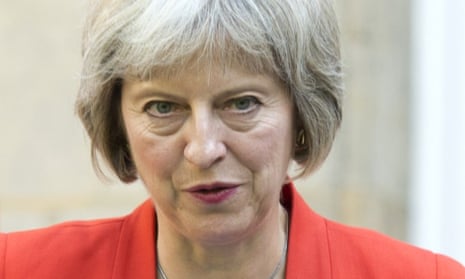Only European migrants with a job lined up should be allowed into the UK, the home secretary, Theresa May, has said, arguing that current levels of migration are unsustainable.
Her comments came after figures from the Office for National Statistics showed migration to Britain had hit a record high, reaching 330,000 in the past year to March. The rise comes despite a pledge made by David Cameron in 2011 to bring down immigration to the tens of thousands.
“Net migration at that volume is simply unsustainable,” May wrote in an editorial in the Sunday Times. “It puts pressure on infrastructure, such as housing and transport – and public services, such as schools and hospitals.”
She argued that the biggest single factor preventing the government from meeting its immigration target was net migration from the EU. “While net migration from outside the EU is 10% lower than it was in 2010, net migration from within the EU has more than doubled,” May said. “That is why this government’s renegotiation of Britain’s relationship with the EU is so important.”
May said that suggesting migration cannot be controlled within the EU – which gives freedom of movement to member state nationals – was “defeatist and wrong” and flies in the face of the evidence.
“Reducing net EU migration need not mean undermining the principle of free movement. When it was first enshrined, free movement meant the freedom to move to a job, not the freedom to cross borders to look for work or claim benefits.”
Four in 10 of the migrants who came to the UK last year came with no job waiting for them, said May, and this “search for a better life” has had huge economic costs for the countries they’ve left behind.
“A third of Portugal’s qualified nurses have migrated; 20% of the Czech Republic’s medical graduates leave as soon as they qualify; nearly 500 doctors are leaving Bulgaria every year.”
The home secretary said countries across Europe were realising that the Schengen agreement – which produced Europe’s borderless area – has exacerbated the migration crisis that has dominated the continent this summer.
“The events of this summer have shown that the most tragic consequences of a broken European migration system have been borne by those at risk of exploitation,” she said. “And the greatest beneficiaries have been the callous gangs who sell false dreams and trade on the free borders within the EU.”
Earlier this month, May visited Calais to inspect new security measures preventing migrants from reaching England via the Channel tunnel. Up to 5,000 migrants are estimated to be in the French port, with at least nine people known to have died trying to make the journey into Britain since June.
Unprecedented numbers of migrants are reaching EU borders, surpassing 100,000 in July alone and reaching more than 340,000 this year so far. Italy and Greece are struggling to cope with the daily influx of migrants and refugees, while Macedonia has declared a state of emergency.
John Cridland, the director general of the CBI, said that evidence showed that the vast majority of EU migrants to the UK provided a benefit to the economy.
He said the CBI would be concerned if EU workers were required to secure a job before arriving in the UK as it would “cause issues for firms without the capacity to advertise and recruit across the whole of Europe.”
“Our hospitals and care homes couldn’t function without overseas workers; building sites that we need to deliver more homes and big infrastructure projects would also stall, for example,” said Cridland.
“But the system must be about freedom to work, not for the minority who do not contribute, so the government should continue to work with our European partners to make sure the rules are fit for purpose for everyone.”
May also took aim at international students, saying the link needed to be broken between “short-term study and permanent settlement in this country”.
“But Thursday’s statistics clearly show that too many students are not here temporarily,” she said. “The gap between the number of non-EU students coming to this country and departing each year is 96,000 – half the net migration from beyond the EU.
The home secretary has been looking into further tightening up the rules surrounding student visas, with a leaked document sent to ministers showing she was considering requiring international students to demonstrate they had significant independent financial means before offering them a place to study. The document suggests that universities be forced to “develop sustainable funding models that are not so dependent on international students”.

Comments (…)
Sign in or create your Guardian account to join the discussion